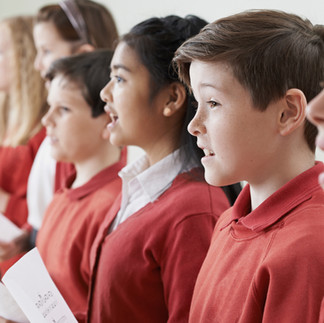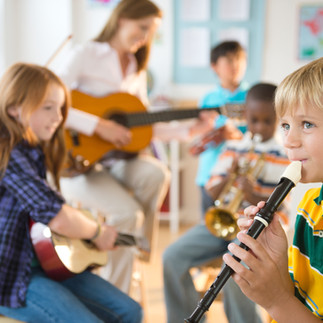Part 14 -Music in Schools vs. Home: Composing a Comprehensive Education
- FRETBOARD WARRIORS

- Apr 1, 2024
- 2 min read
The melody of music education resonates both in the classrooms of schools and the comfort of home, each playing a distinct yet harmonious role in a child’s development. This exploration delves into the symbiotic relationship between school music programs and home music education, highlighting how parents can effectively supplement and enrich their child’s musical journey.
The Ensemble of School Music Education
School music programs offer structured, curriculum-based learning that introduces students to the fundamentals of music, including theory, reading music, ensemble work, and a variety of musical genres. These programs are essential for providing a broad, communal learning experience. Students benefit from the expertise of trained music educators and the opportunity to perform in bands, orchestras, and choirs, learning cooperation, discipline, and the joy of shared performance.
The Solo of Home Music Education
Home music education, guided by parents and personal tutors, offers a more personalised learning experience. It allows children to delve deeper into their musical interests, whether that’s mastering a specific instrument, exploring music production, or composing. The home environment fosters a safe space for creative experimentation and individual expression, free from the constraints of a structured curriculum.
Harmonising School and Home
Parents play a crucial role in bridging the gap between school music programs and home education. Here’s how they can supplement and enhance their child’s musical education:
Encourage Practice: Regular, focused practice at home is essential for mastering an instrument. Parents can support by creating a consistent practice schedule, providing a dedicated practice space, and showing interest in their progress.
Expand Musical Horizons: While school programs might offer a broad overview, parents can help children explore music that interests them specifically, be it through genre exploration, concert attendance, or introducing them to digital music-making tools.
Provide Additional Lessons: If resources allow, private lessons can complement school learning, offering personalised guidance to refine skills or explore areas not covered in school.
Engage in Musical Activities: Participating in music-related activities as a family, from attending live performances to informal jam sessions at home, reinforces the value and joy of music.
Conclusion
The most effective music education is one that harmonises the structured learning of school programs with the personalised, interest-led exploration possible at home. This comprehensive approach ensures students not only develop their musical skills but also foster a deep, lifelong appreciation for music. As we move forward, let’s embrace our role as parents in this educational symphony, playing our part to support and enrich our children’s musical journeys.
Part 15: A Call to Action for Parents
Conclude the series with a powerful call to action for parents to be the change agents in their children’s musical education.
Let's rock this!
Debbie Leigh Driver
Founder
Fretboard Warriors
Unleash the Rockstar Music Education



















Comments